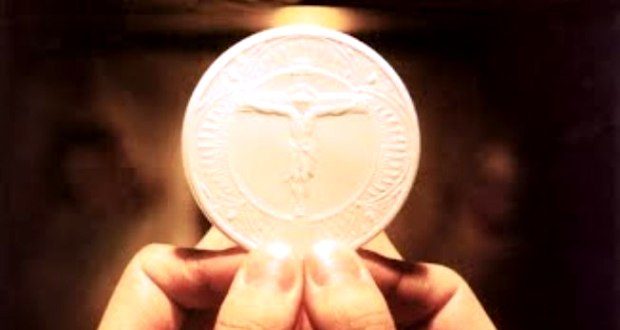Today we celebrate a gift born of blessings from Our Lord, the blessing that bread and wine, combined with his sacrifice, become his Body and Blood, the Eucharist.
The First Reading today shows us a foreshadowing of the gift we are celebrating today. Abram, who we know today as Abraham, our father in faith, had just rescued his nephew Lot from kings who captured him during a raid. The high priest Melchizedek was a mysterious figure in the Old Testament: he almost came out of nowhere to bless Abram for the rescue, and Abram paid him a special tribute for the blessing. A priest brings forth bread and wine and a blessing, and Abram gives him a tribute…Does this sound familiar? Does it remind you of anything you do on Sundays? I’m not referring to the collection basket. In the letter to the Hebrews we see the connection between Melchizedek and Christ: Christ is that priest who brings bread and wine, but above all a blessing, a transforming one or, as the theologians say, a transubstantiating one. Through Christ’s blessing that bread and wine become his body and blood, soul and divinity: the Eucharist.
In Abram’s case this blessing was not just for him, but for his descendants, and in the Second Reading today Paul tells the Corinthians that he is just a bearer of the blessing too. Paul says, “I received from the Lord what I also handed on to you,” and then he recalls the words priests says every time Mass is celebrated over the bread and wine so that they become the Body and Blood of Jesus Christ. As often as we eat this bread and drink this cup, we proclaim the death of Jesus until he comes, as St. Paul tells the Corinthians, and, as we pray in Mass, until he comes in glory. Every celebration of the Eucharist is a sacrifice. We offer up the sacrifice of the Son of God.
In today’s Gospel Jesus teaches us that he never intended for us to go it alone. When he ascended into Heaven, he promised he would be with is until the end of the age. He remains with us through the Eucharist. He didn’t tell the disciples, “send them off, tell them to read a book, go see a doctor, apologize that the catering was not arranged.” They came to Christ and received a blessing that transformed them and others. If you don’t see the blessings in your life, ask Jesus to show you. He is in every tabernacle so that you can approach him and ask him for guidance, healing, strength, direction. He comes into your heart every time you receive Holy Communion worthily. He may ask something of you that makes no sense, that is hard to understand, that seems too much for your strength, beyond your means, but he will bless it. He will transform it into twelve wicker baskets full of blessings. They may not be the blessings you expected—the disciples didn’t expect at the end of the day that they would have twelve baskets full of food and thousands of people fed—but Jesus will help you to count your blessings. Let’s offer Jesus our whole life so that he can bless it and transform it.
The Eucharist is more than just a blessing. It is Our Lord, the bearer of blessings. Our Lord remains with us outside the times of participating in Mass so that we can spend time together and continue to be blessed. When did you last spend some time in Adoration before the tabernacle? The bearer of blessings is waiting for you.
Readings: Genesis 14:18–20; Psalm 110:1–4; 1 Corinthians 11:23–26; Luke 9:11b–17. See also Solemnity of Corpus Christi, Cycle C, Solemnity of Corpus Christi, 17th Sunday in Ordinary Time, Cycle B, 2nd Week of Easter, Friday, 1st Week of Advent, Wednesday, and Tuesday after Epiphany.



